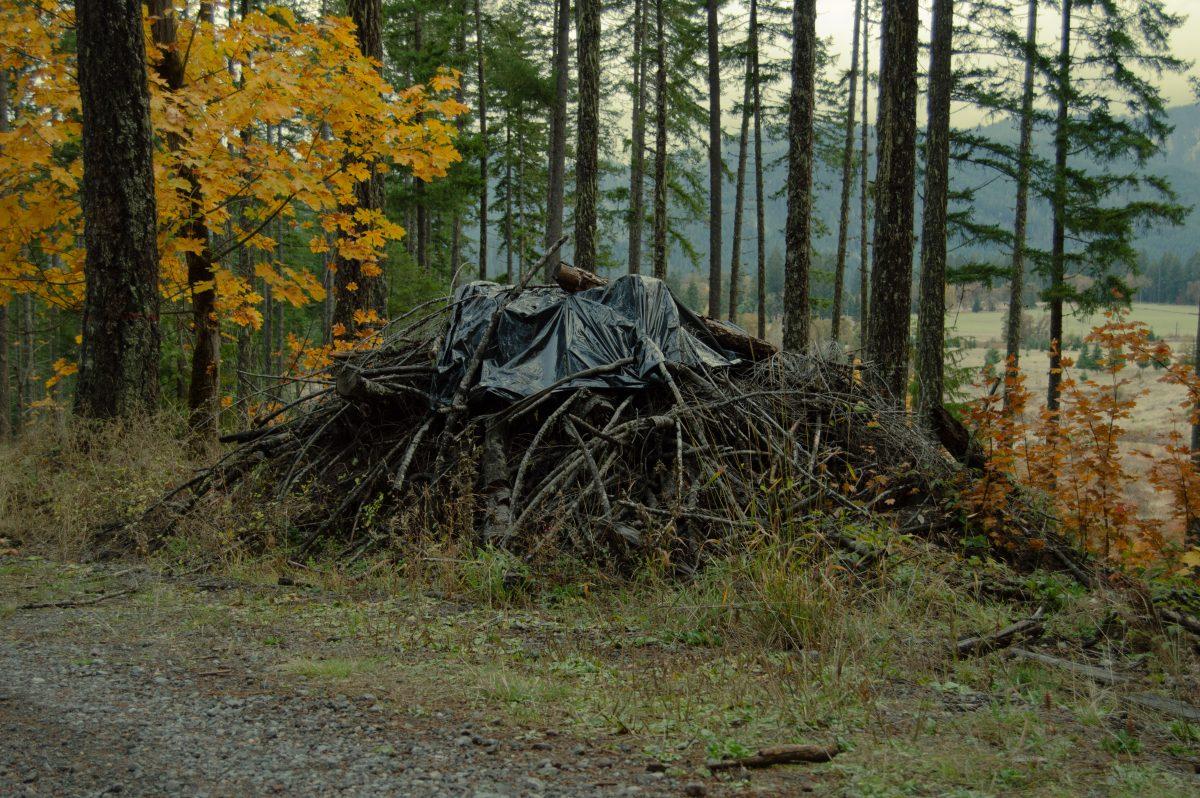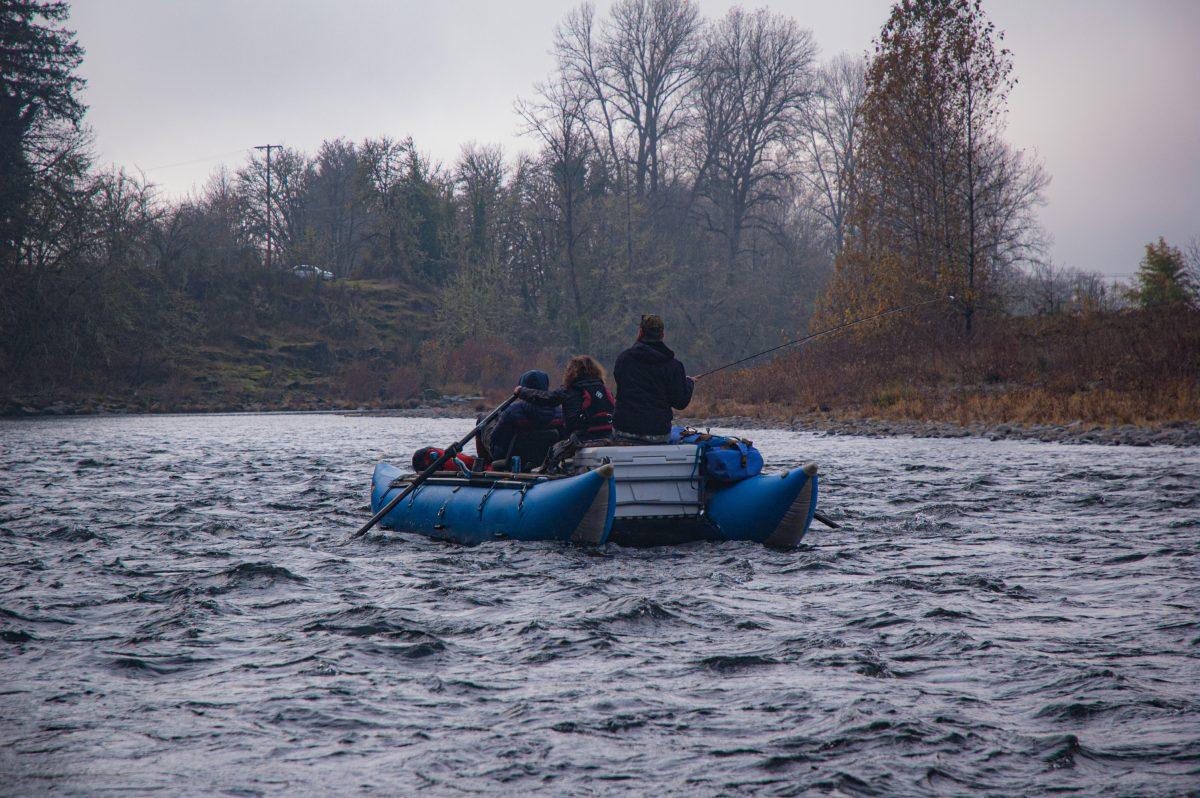It’s Nov. 11, 2022, and Oakridge residents are slowly filing into the unique dining experience turned theater, Lion Mountain Bakery. It’s the opening night of “Blue Moon Burlesque,” a show created by locals to lift morale during the Cedar Creek Fire. At this point the smoke has cleared, and rain showers are dousing the town as winter approaches. Inside, attendees are greeted with warm smiles and ice-cold margaritas, and the chasmic room is filled with lively chatter as the show is about to begin. People find their seats, buzzing with excitement, and a hush falls over the crowd when the lights dim, commencing an evening of comedy, music and burlesque.
While the smoke was trapping everyone indoors, community member Chelsi Corcoran-Rhule had a spark of inspiration and decided to put together the performance. She wanted to uplift the community and give everyone a night to remember when the smoke finally cleared.
“I was just in bed one morning and thought, when the smoke clears, we need to have fun. We need to do something that’s energetic and exciting and sexy,” Corcoran-Rhule says.
The weeks of preparation for this moment were colored with hard work, grief and pain. Burn scars are still visible from the peak of Dead Mountain, and clouds of smoke choked the town for months. Locals say they felt fear rooted in their guts during the burn season, and it took the whole village to fight that uphill battle.
Still, love, pride and community spirit erupted from calloused hands as applause shattered the silence. Resilience, a trait that’s been apparent in Oakridge residents long before the fire, sparked.
What looks like a small stretch of Highway 58 where a passerby may fill their gas tank is actually a colorful collection of residences and small businesses — whose employees know most of their customers by first name. For an Oakridge local, walking down 1st Street almost guarantees a friendly face and lively chat.
This being said, many Oakridge locals reminisce about a time when the town was thriving economically as well as socially before the closures of the Westfir Mill and the Pope and Talbot Mill. In 1990, the federal government enacted logging restrictions that closed off much of the Willamette National Forest to the timber industry. Oakridge was historically a timber town, and the logging restrictions followed by the mill closures caused about 1,400 people to lose their jobs. At the time, this was about one third of the population.
Since this economic collapse, many citizens have fallen on some difficult financial times. Much of the population moved away after individuals and family members lost lumber jobs, and this cut the already small population by a large margin. According to the 2020 census, the poverty rate is now at a staggering 37.7%, an 11% increase from the year prior and well above the 2020 United States average of 11.4%. Since the mill closures, the population went from 4,800 people to a little over 3,300, also according to the census.
Out of the remaining population, the biggest employers are the U.S. Forest Service and the local school district. Others might work in a few of the small businesses in the area, but many make the one-hour commute to Eugene and Springfield. The most popular occupations include firefighting, construction, extractions, accommodations and food service.
“You can’t go forward unless you really look at your past,” says Susan Dodge-Bryant, a local artist and longtime Oakridge resident. Dodge-Bryant is excited to see more families and young people move to the area in recent years and describes this as a “turning point” for the community after the mill closures. Dodge-Bryant performed alongside her peers in Blue Moon Burlesque and saw the occasion as a physical manifestation of that turning point.
Many residents were born and raised in Oakridge and oftentimes tend to move away and come back later in life. Sarah Altemus-Pope, who is an Oakridge native, moved to Eugene for her undergrad and then pursued a career as a smokejumper in Missoula, Montana. After 10 years of jumping out of planes into live fires, she moved to Washington D.C. to work for the U.S. Forest Service’s International Programs before moving back to Oregon to pursue her master’s degree. Altemus-Pope’s multitude of experiences with the U.S. Forest Service definitely informed her future work, but so did her home life.
“I grew up in a timber community and had a family that worked in the woods,” she says, “and then I started working in the woods when I was 16. Through spending so much time in the woods, I’ve understood the connection between rural economies that are forestry-based and the work that’s available. Just because there’s not a mill here anymore doesn’t mean there’s not people whose livelihoods are still very much tied to what’s happening in the woods.”
In 2016, Altemus-Pope started the Southern Willamette Forest Collaborative, an organization aimed at connecting community members and land management agencies in order to “work through conflict and build trust.” The collaborative was born out of Altemus-Pope’s thesis project for her master’s degree in conflict resolution and grew into an organization that has accomplished a wide variety of projects. These projects are aimed at forest restoration, improved air quality and ensuring Oakridge as a Firewise community. Firewise USA is a national program that helps communities who are at risk for wildfire increase the ignition resistance of their homes and structures.
Altemus-Pope and other members of the collaborative have been partnering with the Oregon Department of Forestry to complete Firewise assessments around Oakridge proper and the greater Oakridge area. They secured the funding for it in 2019 and had just completed improvements within the greater Oakridge area when the 2020 fires hit.
“That changed the perspective of fire in Western Oregon for a lot of people,” Altemus-Pope says. “They realized that we’re in forests that are still fire-prone, and wind-driven fire is extremely, incredibly dangerous.”
Altemus-Pope also started Oakridge Air, a program funded by the U.S. Environmental Protection Agency and aimed at improving the air quality in the area. Oakridge Air was initiated with the goal of improving wintertime wood smoke and then branched out to the realm of wildfire smoke during the 2020 fire season. During the most recent Cedar Creek Fire, Oakridge Air was able to distribute over 3,000 air purifiers to its constituency. This allowed for each household in the area to have at least one room of clean air.
“Sarah is one of the sharpest young women in our community,” says Lynda Kamerrer, the retired owner of a former local bed-and-breakfast. “When the AQI is 500 or 600, you cannot keep it out. The smoke comes in, and if you have health issues, you’re scrambling to figure out how you’re going to evacuate or protect yourself.”
The Cedar Creek Fire started on Aug. 1, 2022, caused by a series of lightning strikes that touched down about 15 miles east of Oakridge, igniting a dense section of the Willamette National Forest. By Aug. 15, the fire had scorched 4,422 acres of forest, with no sign of containment. By Aug. 27, that number grew to 7,632 acres.
In the early weeks of the fire, it was incredibly difficult for ground crews and firefighters to combat or contain the burn due to rugged and inaccessible terrain. This caused the fire to spread quickly across a large area before any hope of containment.
As the fire grew, so did the crews. On Sept. 19, there were over 2,500 personnel actively contributing to the firefighting effort. At this point, the fire was only 11% contained and had burned over 113,000 acres of land, according to the official InciWeb report. The AQI index in Oakridge reached levels that were off the charts, as the fire got within six miles of the Oakridge city limits.
“We felt confident that the fire command was doing the best job they could,” says Kamerrer. “It was just up to Mother Nature. The fire started with lightning and it was going to end with natural causes: the rain and snow.”
According to Altemus-Pope, one of the biggest barriers that Oakridge Air faced during their outreach process was communication. She states that only 63% of residents have internet in the home, and most of those people are accessing it on their phones. There used to be a print newspaper in town, called the Highway 58 Herald. The paper ceased print production during the pandemic and then moved completely online — which contributes to the same communication barriers.
“That was a major form of information sharing, and so that was a big hit when it closed,” Altemus-Pope says. “Word of mouth is the strongest information source in our community.”
Oftentimes if a piece of information needs to get out, flyers are posted in the local stores and on the post office bulletin board. This posed an issue during the intense smoke, as most of the population was stuck indoors, and many did not have enough reliable internet access or technological literacy to stay informed about the fire day-to-day.
The citizens of Oakridge were put under a Level 3 evacuation notice on Sept. 10. This information was posted to InciWeb and the city’s official Facebook group. On the day that the Level 3 evacuation warning was issued, the Lane County Sheriff’s Office drove around town with a megaphone, alerting any remaining residents that the fire was coming in hot.
Erika Stalcup was one of these residents. Stalcup is a volunteer firefighter for the U.S. Forest Service and was stationed on the Cedar Creek Fire. She’s a legacy of her father, Lloyd Stalcup, who has worked at the Forest Service for over 44 years. Stalcup and her family heard the megaphone warning as they were already packing up for evacuation.
“It was devastating,” she says, “thinking that I still had to come back to Oakridge regardless.”
Stalcup’s first instinct was to get her family and pets to safety. She evacuated with her family on Friday and then returned to town on Sunday for her shift at the pub. The following Monday, she pulled a 24-hour shift fighting the Cedar Creek Fire. Stalcup wasn’t the only one who was put in this position. She describes how both of her best friends have husbands who work directly on the fire line.
“They didn’t get to come home when we had to evacuate,” Stalcup says. “It was very hard, knowing that you have a loved one out there fighting that fire, day in and day out for weeks. You only get to come home to shower, scarf down a banana and sleep before you’re back out.”
When Stalcup returned to Oakridge for her firefighting shift, she saw a familiar face wandering the streets – a houseless individual whom she recognized from growing up in town.
“She’s somebody’s daughter. She’s somebody’s mom. She’s someone’s cousin. She’s a sweet person,” Stalcup says. “My heart just broke for the people who could not get out.”
Stalcup and another young volunteer firefighter, Emerald Escovedo, both performed in Blue Moon Burlesque following the Cedar Creek Fire. Escovedo is also a resident of Oakridge, and spent time fighting the Cedar Creek Fire in 2022.
This performance was not something that Oakridge had ever seen before. The Zero Clearance Theater —the local performing arts group that put on the production — had only ever done classical plays. This was their first show that involved singing, dancing and risque comedy. The Zero Clearance Theater is directed by Loren Christopher Michaels, a multidisciplinary performer who moved to Oakridge to be with his wife. Michaels has performed across the world, and most notably in Las Vegas’s MGM Grand, Caesar’s Palace and The Venetian.
Blue Moon Burlesque took place in the bakery-turned-theater, Lion Mountain Bakery. This was the first show that had ever taken place in the bakery, as the stage had only been installed six weeks prior. Jacqui Lamont created Lion Mountain Bakery in a self-described “act of insanity.” After a careful assessment, she noted two things that Oakridge needed and lacked: a gym and a bakery. As building a gym tends to be both difficult and expensive, she decided to direct her efforts towards creating Lion Mountain Bakery.
The bakery was originally located on 1st Street, within the epicenter of town. In November of 2015, a fire broke out in the adjacent building, scorching her business in the process. Luckily, much of the equipment was salvageable, so she moved to her current location on Highway 58 in the spring of 2017.
The new Lion Mountain Bakery started out as a cavernous, concrete-walled building and grew into a unique dining experience, art gallery and theater. The room is divided in two, with makeshift walls displaying work by local artists and artisans. The wide array of various tables and chairs have been donated by community members, as well as curated from Lamont’s personal family collection. The bakery embraces maximalism, and each object within the walls carries its own story, typically rooted in the town of Oakridge.
“Creating a sense of community and a place where people gather was really important to me,” Lamont says.
Shortly after Lamont moved the bakery to the new location, another fire broke out in the neighborhood, burning the entire hillside behind Lion Mountain Bakery. No businesses or residences were damaged in this fire, but Lamont found the situation unbelievable. Lamont carried these experiences with her once the Cedar Creek Fire started inching closer and closer to Oakridge.
“I grew up on the East Coast, so we didn’t have forest fires,” Lamont says, “I was freaking out because we didn’t know what was going to happen from day to day. I’m extremely grateful for all the people that showed up to help.”
When Corcoran-Rhule approached Lamont about the idea of doing a burlesque show, she was more than thrilled at the idea. Lamont was a theater major in college and finds it important for everyone to have a creative outlet.
“This show has brought in so many new people,” she says. “We really needed some fresh new energy.”
Fresh new energy seems to be the perfect descriptor for a production like this one. Made up entirely of local community members, the cast consisted of firefighters, business owners and mothers alike. Stalcup kicked off the show with a song: her rendition of Blue Moon, the popular ballad from 1934. Corcoran-Rhule ended the show with her own version — a reprise that tied the evening together in a bow.
They didn’t leave a dry eye in the house. Applause rang throughout the peculiar Lion Mountain Bakery — the hidden gem of Highway 58. Following the devastation of the Cedar Creek Fire, the show served as a reminder that Oakridge is vibrant and alive, and no amount of wildfire smoke can stifle this community’s spirit.
A charred stump sits on the fire line. This is one of the areas where hundreds of firefighters were working to contain the burn. Those people did the very best they could to hold the line,” says Lynda Kammerer, Oakridge resident. “They had over 2000 people assigned, and you could see how much was going into this. And if people knew the terrain out there; it's remote, it’s steep and there’s a lot of fuel.”









![[Photo Courtesy of the Lara Family]
Ruben embraces his beloved childhood goat, Katrina.](https://ethos.dailyemerald.com/wp-content/uploads/2025/05/katrina-1-1060x1200.jpg)


